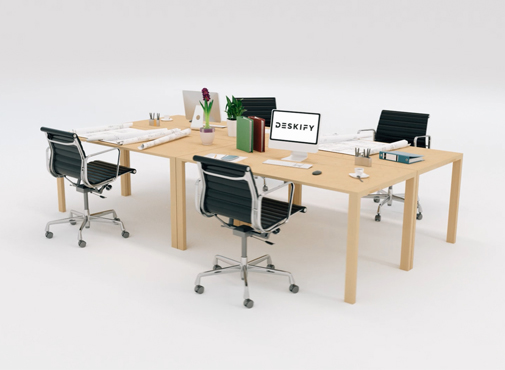
Working in the new normal
Initiatief
Sustainable pop-up walls for working at a meter and a half
There is a huge run on plastic to make cough screens for cash registers, public spaces and offices. Not exactly sustainable. That is why business partners Niels Frenk, Ronald Hagenstein and Marc Reijm developed a sustainable pop-up wall system for working in the ‘new normal’. Made from recycled PET bottles. Niels Frenk: ‘There are many solutions on the market that are not sustainable. We want to offer a solution that is.’
How did you come up with the idea?
‘We had just registered our company Viltr with the Chamber of Commerce when Corona came. Viltr uses recycled PET felt panels to create designs for companies and individuals. When the demand for cough screens arose, we looked at how we could respond to this with our product. We saw many ugly – and often expensive – disposable plastic solutions around us. We immediately thought: we can make this much more sustainable and beautiful with our technology and material.’
And that’s how Deskify came to be.
‘We would like to offer a sustainable solution for a current problem. Nobody knows exactly what the ‘new normal’ will look like. What we do know is that we’ll have to work together at a distance of 1.5 metres. This requires solutions in the workplace. We looked at how we could make something that is simple, custom and easy and quick to assemble (so that we don’t have to be on-site to do it). That became Deskify.’
Tell us about using PET bottles as a basic material.
‘PET bottles are plastic bottles like those with water or soda in, for example, that you can buy at the supermarket. The bottles are thrown away or end up in nature. There are now companies that collect disposable plastic and give it a second life in the form of PET felt panels. We use these panels to make the pop-up walls for workplaces.’


Your product looks very simple in the animation. Like a kind of IKEA construction kit.
‘Our product is very accessible and can be tailor-made. In consultation with our client, we can make recesses in the panels for cables. After the package has been delivered, a facility employee, for example, can install the workplaces without our help. You see many solutions in the workplace that are not always beautiful. Like plexiglass plates hanging from the ceiling. With our system, you can create pop-up workplaces that exude character.’
What does a pop-up workplace cost?
‘If you want panels to shield a desk on three sides, you end up at € 200 ex VAT per desk. A more expensive variant with plexiglass on the top costs € 325 ex VAT per desk. It’s cheaper and nicer than much less sustainable alternatives. The first requests came in immediately after the press release about Deskify. Ever since then, we receive daily requests for quotations from many businesses, including governments, start-ups and IT companies.’
"Of course it is exciting. That’s part of doing business."
How do you combine sustainable enthusiasm and commerce?
‘We are very enthusiastic about our sustainable product, and we’re a company with a commercial nature. Responding to market demand is part of doing business. But we don’t want to take advantage of the Corona crisis. We don’t have to make a big profit. From a sustainability perspective, we’re now looking at the option of taking the material back in due course. Suppose companies no longer need the screens in a year, then Viltr can transform them into a beautiful work of art for their wall.’
Could Corona herald the end of the office garden and mean that the pop-up walls remain?
‘Who knows. There has been a lot of negativity about office gardens over the years. Is it productive? Is it a pleasant workplace? Is it good for the working atmosphere? Is it extra stressful? Are you able to concentrate well? Corona raises the question: is an open workplace still a possibility? I’ve been in many office gardens and people always look for peace and privacy. They still want to create a cocoon for themselves.’
Text: Esther Wienese
Photos: Viltr/Deskify

